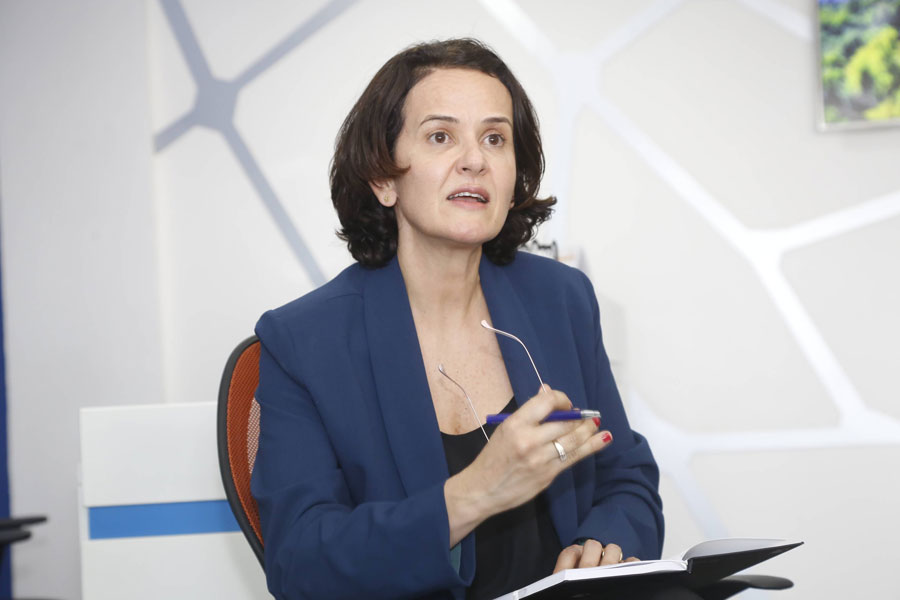
Commentaries | Jan 03,2021
Jan 21 , 2023
By Landry Signé
The past year has been challenging for Africa. After a hopeful 2021, during which the continent-wide GDP increased by nearly seven percent and every region experienced real growth, the economy slowed in 2022 amid rising inflation, monetary tightening and geopolitical tensions.
It was also a year where African countries were finally able to make their voices heard on the global stage. At the start of another critical year, with the continent’s GDP projected to increase at a relatively modest pace of 4.1pc, governments can take several steps to boost economic activity and ensure a sustainable future.
For starters, policymakers must foster trade and investment through the African Continental Free Trade Area (AfCFTA). Under a fully implemented trade unit, Africa’s combined consumer and business spending is expected to reach 6.7 trillion dollars by 2030 and 16.12 trillion dollars by 2050, transforming value chains and potentially reducing poverty.
Eight countries- Cameroon, Egypt, Ghana, Kenya, Mauritius, Rwanda, Tanzania and Tunisia, began trading under AfCFTA’s Guided Trade Initiative last year. To build on this momentum in 2023, policymakers must accelerate the implementation of the agreement’s subsequent phases, improve intra-African coordination, and call attention to early successes. Moreover, eliminating non-tariff barriers by introducing reporting and monitoring mechanisms would reduce business costs and encourage countries to increase imports.
Policymakers should also rely more on Fourth Industrial Revolution (4IR) technologies like artificial intelligence and cloud computing to create new value chains and strengthen economic resilience. To realise the transformative potential of these tools, political leaders must honour the infrastructure commitments they made at the African Union’s 2022 summit on industrialisation and economic diversification.
They should also consider investing in strategically important industries, such as pharmaceuticals, agriculture and agro-processing, the automotive sector, and logistics. Sub-Saharan governments must also invest in education, particularly in STEM (science, technology, engineering, mathematics) and digital skills, and seek partnerships with private-sector actors to expand access to information and communication services and mobile phones.
At the same time, as Africa’s economic future hinges on its ability to redefine its global status, governments must build on recent diplomatic breakthroughs. In the past few years, African governments have assumed a more prominent international role, presenting a united front in multilateral climate negotiations. US President Joe Biden has called for the AU to become a permanent member of the G-20, which would help solidify the AU’s position as the world’s top agriculture negotiating group. Agreeing on a shared agenda would enable them to secure funding for sustainability-related projects and hold the US, China and the European Union to their promises.
Given the impact of the pandemic, rising inflation, and climate change on income and wealth disparities across Africa, concerted action is becoming critical. Without it, the UN estimates that at least 492 million Africans will be pushed into extreme poverty by 2030, and at least 350 million will remain extremely poor by 2050. Moreover, despite recent progress toward gender equality in educational opportunities and political representation, African women are more likely to live below the international poverty line, experience severe food insecurity, and leave the labour force to perform care work.
To achieve the UN Sustainable Development Goals, they must focus on providing quality education, health care, and job-creation programmes that leave no one behind, particularly women and young people. African development agencies such as the AU’s Development Agency must be given the resources and authority they need to fulfil their mission.
Such capacity building will, however, require the governments to address institutional decay. As Freedom House’s annual Freedom in the World report shows, 2022 was the 16th consecutive year of global democratic decline, and Africa is no exception. Political instability, corruption, and lack of accountability can undermine even perfect policies if allowed to persist. By working with partners and using evidence-based methodologies to monitor projects, assist in implementation, and guide decision-making, African countries could bridge the gap between policy goals and outcomes.
Lastly, ensuring a fair and sustainable green transition remains the most pressing issue facing the most climate-vulnerable continent. While African countries would need 2.8 trillion dollars by 2030 to meet the emissions targets set by the 2015 Paris agreement, the continent's annual climate finance inflows currently amount to only 30 billion dollars. But governments can and must build on the momentum generated by the UN Climate Change Conference (COP27) in Egypt, which resulted in a groundbreaking decision to create a “loss and damage” fund to help developing countries mitigate the worst effects of climate change. Policymakers could mobilise such resources to invest in adaptation efforts and renewable energy.
African leaders must use this moment to accelerate the continent’s shift to a carbon-neutral economy. In what is sure to be a pivotal year for climate-change action, Africa can and must make significant progress toward an equitable, sustainable and resilient future.
PUBLISHED ON
Jan 21,2023 [ VOL
23 , NO
1186]


Commentaries | Jan 03,2021

Viewpoints | Jun 26,2021

Commentaries | Jan 07,2023

View From Arada | Feb 25,2023

Viewpoints | Jun 22,2019

Commentaries | Aug 24,2019

Commentaries | Feb 12,2022

Agenda | Dec 07,2019

Commentaries | Jun 28,2025

Exclusive Interviews | Nov 06,2021

My Opinion | 131974 Views | Aug 14,2021

My Opinion | 128363 Views | Aug 21,2021

My Opinion | 126301 Views | Sep 10,2021

My Opinion | 123918 Views | Aug 07,2021

Dec 22 , 2024 . By TIZITA SHEWAFERAW
Charged with transforming colossal state-owned enterprises into modern and competitiv...

Aug 18 , 2024 . By AKSAH ITALO
Although predictable Yonas Zerihun's job in the ride-hailing service is not immune to...

Jul 28 , 2024 . By TIZITA SHEWAFERAW
Unhabitual, perhaps too many, Samuel Gebreyohannes, 38, used to occasionally enjoy a couple of beers at breakfast. However, he recently swit...

Jul 13 , 2024 . By AKSAH ITALO
Investors who rely on tractors, trucks, and field vehicles for commuting, transporting commodities, and f...

Jul 5 , 2025
Six years ago, Ethiopia was the darling of international liberal commentators. A year...

Jun 28 , 2025
Meseret Damtie, the assertive auditor general, has never been shy about naming names...

Jun 21 , 2025
A well-worn adage says, “Budget is not destiny, but it is direction.” Examining t...

Jun 14 , 2025
Yet again, the Horn of Africa is bracing for trouble. A region already frayed by wars...

Jul 6 , 2025 . By BEZAWIT HULUAGER
The federal legislature gave Prime Minister Abiy Ahmed (PhD) what he wanted: a 1.9 tr...

Jul 6 , 2025 . By YITBAREK GETACHEW
In a city rising skyward at breakneck speed, a reckoning has arrived. Authorities in...

Jul 6 , 2025 . By NAHOM AYELE
A landmark directive from the Ministry of Finance signals a paradigm shift in the cou...

Jul 6 , 2025 . By NAHOM AYELE
Awash Bank has announced plans to establish a dedicated investment banking subsidiary...